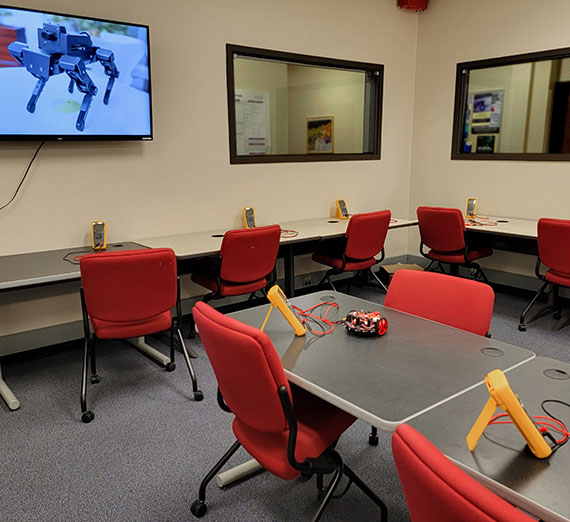
Let your major guide you in your choice of specializations, opening doors to new careers.
The minor is as versitile as the robotics field! Multiple industries use robotics, including aerospace, agriculture, healthcare and defense.
What can you do with Robotics?
Someday, the question will be 'What *can't* you do with Robotics?' These systems mesh with knowledge and expertise from almost every field. For example:
- Health Care and Human Physiology needs healthcare AI developers, analysts for medical imaging and bioinformatics, and clinical research data scientists.
- Neuroscientists have helpful insights for developing human-like cognitive abilities, such as recognizing emotions, understanding natural language, and reasoning.
- Computer Science specialists can create performance analysts and architects for computer systems and embedded systems.
- Mechanical engineers design a robot's physical structure and movement. Material science specialists develop lightweight, durable, and flexible materials to improve a robot's performance and efficiency.
- Biomedical engineers develop robotic systems for surgery, rehabilitation, and prosthetics.
- Environmental scientists develop robots for precision farming and environmental monitoring.
- Business professionals and entrepreneurs bring technology to the market, developing strategies, identifying opportunities, and securing research & development funding.
- Communications writers translate complex information into clear language to inform the public, either for news reports/technology blogs, user manuals and investor documentation, or robotic product marketing.
- Psychologists and Biologists contribute to understanding behavioral ecology or human-robot interaction, user preferences, and the emotional impact of robots on individuals and society.
- Law, Philosophers and Ethicists are already discussing robot rights, accountability, data privacy, and ethical implications of autonomous systems. Those discussions should be based on a realistic, hands-on understanding of the technology.
What You'll Study: Fundamentals & Principals
What You'll Study: Specializations
All Robotics minors choose two specialization courses. There are options for any student from Arts to Physiology, Business to Engineering. The more mathematics courses in your specific major, the more options you have.
Click on any of the following to see some of the options. All students should check the catalog for pre-requisites, and plan ahead with your adviser.
These courses are open to any student who has completed the Computer Systems/Organization Second Fundamental requirement. No additional math or computer science is required!
- CPEN 430 Digital System Design with CPEN 430L Lab
- CPEN 431 Computer Hardware Design & Architecture
- CPEN 436 Machine Learning in Biomed
Many of the Specialization courses are already part of the Mechanical Engineering degree. The Robotics Minor adds the Fundamentals & Principles plus an option to take the CPEN specialization courses. Additional options or courses that would go well with your technical electives include:
- EENG 412 Digital Control Systems
- MENG 411 Instrumentation Systems with MENG 411L Lab
- MENG 451 Computational Dynamics
- MENG 461 System Dynamics and Controls




